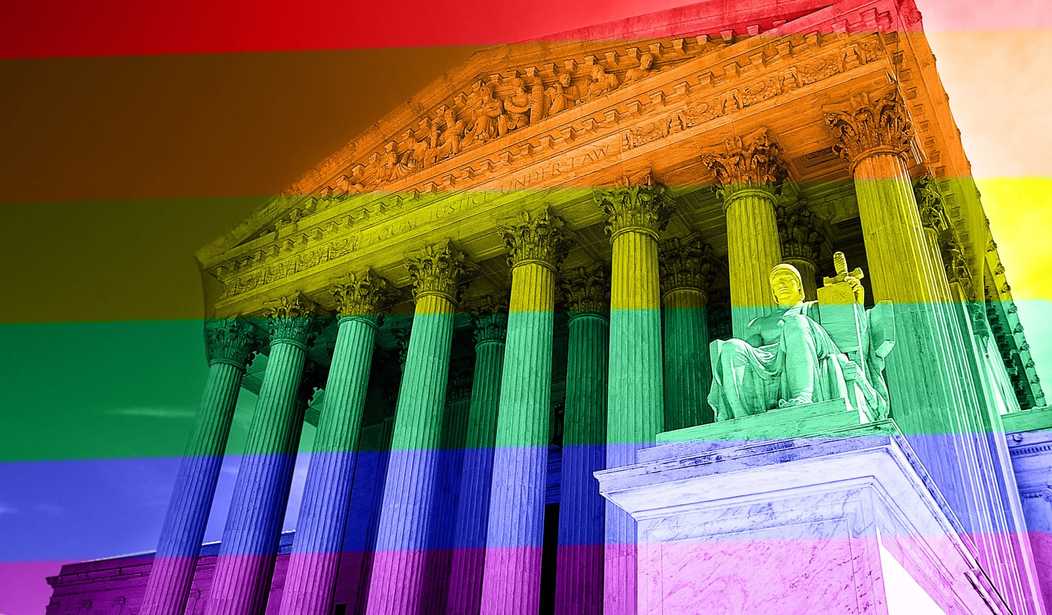Last week, Utah Senator Mike Lee announced that he would re-introduce the First Amendment Defense Act (FADA) in 2017, and his office said it expects the bill to pass under a Trump presidency. Democrats and LGBT activists have attacked the bill as “anti-gay” and as a smokescreen for discrimination against LGBT people. Nothing could be further from the truth.
“Nothing in this bill enables discrimination against LGBT people in any way,” Lee spokesman Conn Carroll told PJ Media in an email statement. “This bill would simply preserve the status quo, ensuring that federal bureaucrats do not take discriminatory actions against individuals, organizations, nonprofits and other entities on the basis of their belief that marriage is between one man and one woman.”
FADA sets out to achieve a very limited goal — to prevent the federal government from discriminating against people or organizations due to their opposition to same-sex marriage. The bill would not protect a business owner who denies service to an LGBT person because of his or her sexual orientation — it is limited to situations that involve religious beliefs about same-sex marriage.
“Specifically, the federal government would be unable to deny or make unavailable any federal grant, contract, license, certification, accreditation, or tax exemption from individuals or groups based on their belief that marriage is the union of one man and one woman,” Carroll explained. This means the bill does not cover many high-profile religious freedom cases.
For instance, Carroll said the bill would not protect Aaron and Melissa Klein, owners of the bakery Sweet Cakes by Melissa. They gladly served a lesbian couple in general, but would not bake a special cake for their wedding. The Kleins were fined $170,000 and their shop went out of business because an Oregon civil rights board decided they had “discriminated” against the lesbian couple. While the Kleins were arguably in the right, this bill would not address their case, as it had nothing to do with the federal government.
Carroll also explained that FADA would not help the case of Kim Davis, a Kentucky county clerk who refused to sign marriage licenses for homosexual couples, and briefly spent time in jail for her conscience.
So if FADA cannot help in these cases and others like them, what exactly is it good for? The bill would protect any institution (such as faith-based colleges, hospitals, and universities) which has or is seeking federal contracts. It could help protect colleges like Brigham Young University, Wheaton College, and Pepperdine University from losing accreditation, scholarship grants, and tax-exempt status.
The bill would have no effect on state-based contracts, and would only protect such institutions from religious-based discrimination on the basis of their beliefs against same-sex marriage. “Just as Congress protected people from being punished for declining to participate in abortions after Roe v. Wade, the First Amendment Defense Act protects people from being punished for their beliefs about marriage after the Obergefell decision,” The Daily Signal reported.
Next Page: Why FADA hasn’t passed yet, and why its prospects are good for next year.
FADA was introduced in both the House and the Senate in 2015, but only got a hearing in the House. The bill faltered amid protests from Democrats and speculation that President Obama would veto the bill if it reached his desk. Some of those conditions are set to change next year.
“November’s results will give us the momentum we need to get this done next year,” Carroll told BuzzFeed. President-elect Donald Trump pledged to sign the bill in September, declaring that it would “protect the deeply held religious beliefs of Catholics and the beliefs of Americans of all faiths.”
“We do plan to reintroduce FADA next Congress and we welcome Trump’s positive words about the bill,” Carroll added.
“The prospects for protecting religious freedom are brighter now than they have been in a long time,” Texas Senator Ted Cruz told BuzzFeed. “We are having ongoing conversations with our colleagues both in Congress and leaders in the new administration about a multitude of ways we can honor the commitment made to the voters in this last election.”
Cruz, who cosponsored the bill in the Senate, and Idaho Representative Raúl Labrador, who sponsored the bill in the House, did not return requests for comment from PJ Media.
While prospects for the bill may be rosy in 2017, Democrats and LGBT activists are likely to lampoon the First Amendment Defense Act as “anti-gay” and a smokescreen for discrimination. Perhaps they need to learn the importance of diversity and accept that, even though the Supreme Court has guaranteed same-sex marriage, many Americans still disagree on the issue. This bill allows Americans to live and let live.









Join the conversation as a VIP Member